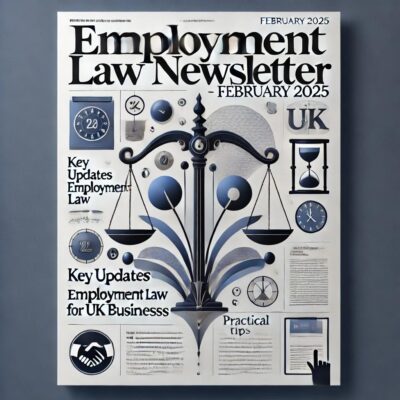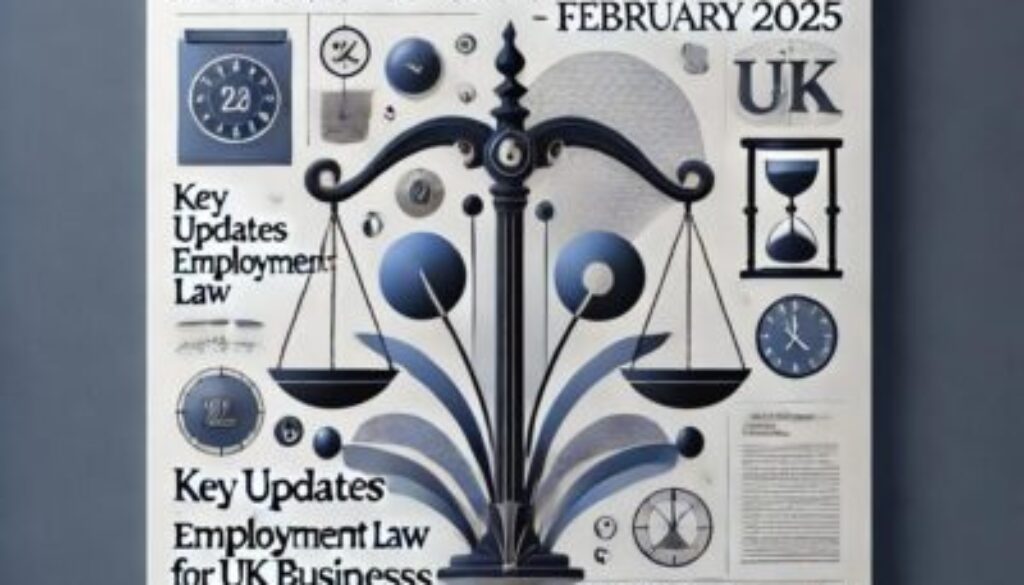Employment Law Newsletter – Feb-25 – Consensus HR in Herts & Beds

In Brief:
The Employment Appeal Tribunal (EAT) has recently made significant rulings that affect employee rights in the workplace. First, the EAT clarified that an employee may be dismissed for a breakdown of trust and confidence, providing employers with a legal basis to terminate employment when this crucial relationship deteriorates. Secondly, the ruling confirmed that foster carers are eligible to bring claims before an Employment Tribunal, which is an important step for individuals in this role seeking employment protection rights. Lastly, a ruling established that consultants can be considered workers under the Employment Rights Act 1996 (ERA), granting them rights that were previously reserved for employees, such as protection against unfair dismissal and entitlement to statutory sick pay. These developments reflect the evolving landscape of employment law and emphasize the importance of understanding and adhering to the latest legal standards for both employers and employees.
EAT rules that an employee can be dismissed for breakdown of trust and confidence
The case of Alexis v Westminster Drug Project [2024] EAT 188 has added some clarification to the controversial claim of the ‘breakdown of trust and confidence’ under the ‘some other substantial reason (SOSR)’ category of fair dismissal.
The Claimant (A) and two others were subject to a restructuring, which resulted in three jobs being condensed into two and each person having to reapply. A, who had previously told her employers that she suffered from dyslexia, was only provided with the interview questions 25 minutes in advance of the first interview, resulting in her underperformance. She was not selected for either position.
A brought a grievance based on the grounds that her dyslexia should have been considered during the interview process. She was offered an additional interview which she rejected. Following the grievance process appeal, A was again offered another interview, and again the offer was rejected. During the grievance process A authored several emails to her manager and the Westminster Drug Project’s Chairperson. Her manager eventually called A into a meeting and stated that the relationship between her and the Westminster Drug Project had completely broken down and that A had clearly lost trust in her employer. This led to A being dismissed by notice on the ground of SOSR.
A claimed unfair dismissal, disability-related harassment, and failure to make reasonable adjustments. The Employment Tribunal (ET) rejected most claims and stated the dismissal was fair. A appealed to the Employment Appeals Tribunal (EAT), arguing her length of service had not been adequately considered and Westminster Drug Project could have given her a warning or used some other method as opposed to dismissing her.
The EAT upheld the ET’s decision that the dismissal was fair. Regarding the lack of consideration of A’s length of service, the EAT stated that an employer only had to take this into account when it was directly relevant to the dismissal. This was not the case here. As for using other sanctions other than dismissal, this was not appropriate in this case as the organisation needed to move forward with its restructuring.
Foster carers can bring Employment Tribunal claims:
In Oni and others v London Borough of Waltham Forest and others ET/3204635/2021, an employment tribunal held that, despite not having contracts with local authorities, foster carers can bring whistleblowing and discrimination claims.
The decision is controversial and likely to be appealed. The ET considered itself bound by the Court of Appeal’s decision in W v Essex County Council [1998] 3 WLR 534 (CA), that foster carers do not have employment contracts with local authorities as their relationship is governed by statute. This meant that they could not bring certain types of claims in the ET, such as:
- The right to have a Statement of Particulars provided on day one of employment (Part I of the Employment Rights Act 1996 (ERA 1996).
- Unfair deduction of wages (Part II of the ERA 1996.
- Unfair dismissal or wrongful dismissal.
- Breach of rights under the Working Time Regulations 1998.
However, the ET ruled that when it came to bringing whistleblowing claims under sections 47B and 48 of the ERA 1996 and discrimination claims under Part 5 of the Equality Act 2010, any refusal by the ET to hear such claims would amount to an unjustified interference with their rights under, respectively, Articles 10 (right to freedom of expression) and 8 (right to family and private life) of the European Convention of Human Rights read with Article 14 (protection from discrimination).
Consultant classed as a worker under ERA 1996:
In Appiah v Tripod Partners Ltd ET/2302929/2023, the ET held that a consultant who contracted with a recruitment agency via a service company was a worker of the agency for the purpose of an unlawful deductions from wages claim under the ERA 1996.
The Claimant, P, was an independent social worker. The Defendant, Tripod, was a recruitment agency and placed P on assignment at the Home Office. The Home Office decided that P fell outside IR35 and should be taxed as an employee. Tripod told P she could have an arrangement via PAYE or contract via a service company. If she opted for a service company, Tripod would deduct income tax and employee national insurance contributions (NICs) from her hourly pay. P decided to contract via a service company.
Tripod subsequently deducted income tax, employee NICs, and employer NICs from P’s pay. P accepted that Tripod was entitled to make deductions for income tax and employee NICs. However, she claimed that the deductions for employer NICs were unlawful under the ERA 1996. Tripod argued that Ms Appiah was not a worker, so could not bring a claim for unlawful deductions.
The ET reviewed P’s relationship with Tripod and concluded P was a worker. She supplied Tripod with timesheets rather than invoices, worked full-time on her assignments, and did not outsource any work. She was not in business on her own account and neither the Home Office nor Tripod were her client in reality. Therefore, she was entitled to bring a claim for unlawful deductions under the ERA 1996 and the ET subsequently upheld her claim.
This newsletter does not provide a full statement of the law and readers are advise to take legal advice before taking any action based on the information contained herein’.
Why Choose Consensus HR?
At Consensus HR, we pride ourselves on offering practical, jargon-free HR support tailored to your business. Our retained services are designed to provide the flexibility, expertise, and peace of mind you need to manage your workforce effectively and stay compliant with UK employment law.




